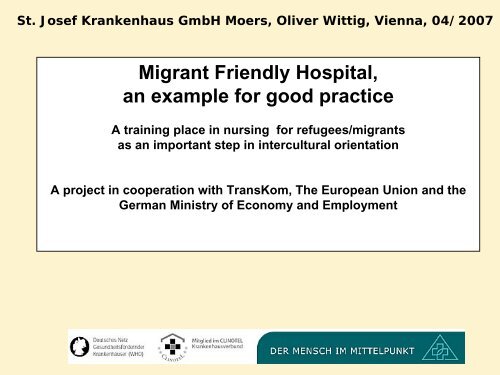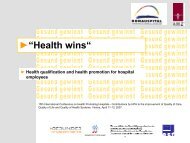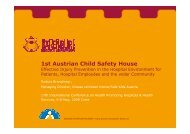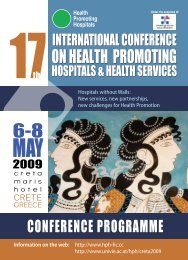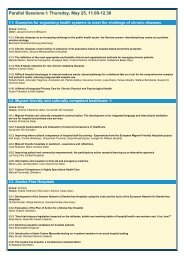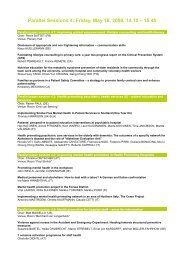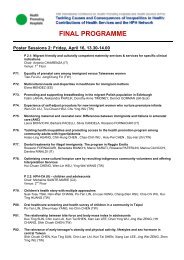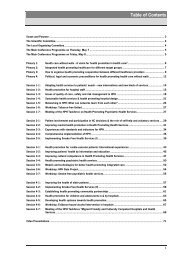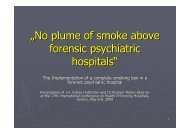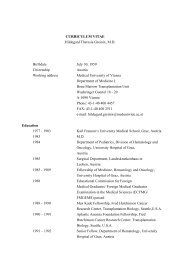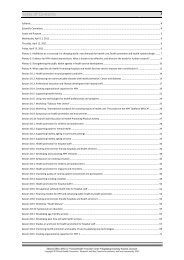Migrant Friendly Hospital A training place in nursing for refugees ...
Migrant Friendly Hospital A training place in nursing for refugees ...
Migrant Friendly Hospital A training place in nursing for refugees ...
Create successful ePaper yourself
Turn your PDF publications into a flip-book with our unique Google optimized e-Paper software.
St. Josef Krankenhaus GmbH Moers, Oliver Wittig, Vienna, 04/2007<br />
<strong>Migrant</strong> <strong>Friendly</strong> <strong>Hospital</strong>,<br />
an example <strong>for</strong> good practice<br />
A <strong>tra<strong>in</strong><strong>in</strong>g</strong> <strong>place</strong> <strong>in</strong> nurs<strong>in</strong>g <strong>for</strong> <strong>refugees</strong>/migrants<br />
as an important step <strong>in</strong> <strong>in</strong>tercultural orientation<br />
A project <strong>in</strong> cooperation with TransKom, The European Union and the<br />
German M<strong>in</strong>istry of Economy and Employment
St. Josef Krankenhaus GmbH Moers, Oliver Wittig, Vienna, 04/2007<br />
St. Josef <strong>Hospital</strong> Ltd Moers
St. Josef Krankenhaus GmbH Moers, Oliver Wittig, Vienna, 04/2007<br />
Board of directors:<br />
He<strong>in</strong>rich Röwer<br />
Manag<strong>in</strong>g director<br />
Dr. med. Thomas Ziegenfuß<br />
Medical director<br />
Klaus Armonies<br />
Technical director<br />
Oliver Wittig<br />
Nurs<strong>in</strong>g manager<br />
Chairman of the supervisory board<br />
Pfarrer (Reverend) He<strong>in</strong>rich Bücker
St. Josef Krankenhaus GmbH Moers, Oliver Wittig, Vienna, 04/2007<br />
Facts and numbers<br />
F<strong>in</strong>ancial volume of the St. Josef Krankenhaus GmbH per year 55 million Euro<br />
Number of employees 1150<br />
Number and distribution of <strong>tra<strong>in</strong><strong>in</strong>g</strong> <strong>place</strong>s:<br />
30 <strong>tra<strong>in</strong><strong>in</strong>g</strong> <strong>place</strong>s <strong>in</strong> nurs<strong>in</strong>g (the <strong>tra<strong>in</strong><strong>in</strong>g</strong> takes <strong>place</strong> <strong>in</strong> co-operation with the nurs<strong>in</strong>g school<br />
at the St. Bernhard <strong>Hospital</strong> <strong>in</strong> Kamp L<strong>in</strong>t<strong>for</strong>t)<br />
2 <strong>tra<strong>in</strong><strong>in</strong>g</strong> <strong>place</strong>s <strong>in</strong> old person care,<br />
4 <strong>tra<strong>in</strong><strong>in</strong>g</strong> <strong>place</strong>s <strong>in</strong> the adm<strong>in</strong>istration<br />
The St. Josef Krankenhaus GmbH is member of the Cl<strong>in</strong>otel hospital group.<br />
The St. Josef Krankenhaus is member of the Network of Health-Promot<strong>in</strong>g <strong>Hospital</strong>s<br />
of the WHO.<br />
The St. Josef Krankenhaus GmbH is member of the transnational group Euregio<br />
Rh<strong>in</strong>e- Waal‘.
St. Josef Krankenhaus GmbH Moers, Oliver Wittig, Vienna, 04/2007<br />
Overview<br />
475 beds <strong>in</strong> the general hospital<br />
116 treatment <strong>place</strong>s <strong>in</strong> the residential home <strong>for</strong> the elderly<br />
100 beds acute rehabilitation<br />
20 treatment <strong>place</strong>s on the geriatric day ward<br />
25 beds on the short term ward<br />
12 treatment <strong>place</strong>s on the day ward<br />
7 beds <strong>in</strong> our hospice<br />
-------------------------------------------------<br />
= 755 beds and treatment <strong>place</strong>s alltogether<br />
+ Mobile nurs<strong>in</strong>g<br />
+ Plann<strong>in</strong>g and construction management Ltd
St. Josef Krankenhaus GmbH Moers, Oliver Wittig, Vienna, 04/2007<br />
1. Sociodemographical facts<br />
The Project<br />
2. The <strong>in</strong>fluence of the migration on the health<br />
3. Healthcare <strong>for</strong> migrants<br />
4. Manag<strong>in</strong>g Diversity<br />
5. Important po<strong>in</strong>ts of the <strong>in</strong>terkultural orientation of health- and social <strong>in</strong>stitutions<br />
6. Recognition of the traps of communication<br />
7. Start<strong>in</strong>g po<strong>in</strong>t lead<strong>in</strong>g modell<br />
8. Start<strong>in</strong>g po<strong>in</strong>t Integration<br />
9. Start<strong>in</strong>g po<strong>in</strong>t Tra<strong>in</strong><strong>in</strong>g<br />
10. Realisation<br />
11. Outcome<br />
12. The next steps
St. Josef Krankenhaus GmbH Moers, Oliver Wittig, Vienna, 04/2007<br />
1. Sociodemographical facts<br />
• S<strong>in</strong>ce 1950 15 Mill. people came from other countries to germany<br />
• 2004: 6,7 Mill. <strong>for</strong>eign people live <strong>in</strong> germany<br />
•1,8 Mill. Turkish, 35% were born <strong>in</strong> germany<br />
•Ca. 1 Mill. <strong>refugees</strong>, 140000 of them don‘t know how sure their stay <strong>in</strong><br />
germany is.<br />
• Ca. 800000 are over 60 years old migrants
St. Josef Krankenhaus GmbH Moers, Oliver Wittig, Vienna, 04/2007<br />
2. The <strong>in</strong>fluence of migration on health<br />
• Health Risks: M<strong>in</strong>ority Status, Social Barriers, Psycho-social Difficulties<br />
• <strong>Migrant</strong>s br<strong>in</strong>g both, higher and lower risks <strong>for</strong> special diseases and keep them<br />
• Family and ethnic orientation can be a health resource.
St. Josef Krankenhaus GmbH Moers, Oliver Wittig, Vienna, 04/2007<br />
• Low vax<strong>in</strong>ation rate with children.<br />
• High maternity death rate.<br />
3. Healthcare <strong>for</strong> migrants<br />
• <strong>Migrant</strong>s are us<strong>in</strong>g more often emergency ambulances.<br />
• Barriers because of language- and <strong>in</strong><strong>for</strong>mation problems. Different po<strong>in</strong>ts<br />
of view on different diseases.<br />
• Besides that there is only little data on the health status of migrants and<br />
<strong>refugees</strong>.
St. Josef Krankenhaus GmbH Moers, Oliver Wittig, Vienna, 04/2007<br />
4. Manag<strong>in</strong>g Diversity<br />
• Differences are normal and not exceptional!<br />
• If diversity is recognized and effectively managed, it can be a positive<br />
potential <strong>for</strong> the organisation.<br />
• „Only some diversity is not possible“ (Maria Schwarz-Wölzl, Wien 2005)
St. Josef Krankenhaus GmbH Moers, Oliver Wittig, Vienna, 04/2007<br />
5. Important po<strong>in</strong>ts of the <strong>in</strong>terkultural orientation of<br />
health- and social <strong>in</strong>stitutions<br />
• Same entrance possibility <strong>for</strong> migrants to all healthcare services. (also<br />
preventive and health promot<strong>in</strong>g)<br />
• Development of effetive structures that are orientated on the life and needs.<br />
• Same entrance possibility <strong>for</strong> migrants to jobs and employment. Same<br />
career opportunities.<br />
• Development of equal team structures. Us<strong>in</strong>g the diversity <strong>for</strong> synergy<br />
effects. Recogniz<strong>in</strong>g different problem def<strong>in</strong>itions and solution strategies.<br />
• Increas<strong>in</strong>g <strong>in</strong>tercultural competence of all employees.
St. Josef Krankenhaus GmbH Moers, Oliver Wittig, Vienna, 04/2007<br />
6. Recognition of the traps of communication :<br />
Members of the majority population<br />
• Arrogance<br />
• Idealization<br />
• Devaluation<br />
• Blam<strong>in</strong>g maladaptation <strong>for</strong> communication problems<br />
• Exclusion
St. Josef Krankenhaus GmbH Moers, Oliver Wittig, Vienna, 04/2007<br />
• Overreaction<br />
Recognition of the traps of communication :<br />
Members of the m<strong>in</strong>ority population<br />
• Blam<strong>in</strong>g the ignorance and arrogance of the majority <strong>for</strong> communication<br />
problems<br />
• High expectations to the majority and their understand<strong>in</strong>g.
St. Josef Krankenhaus GmbH Moers, Oliver Wittig, Vienna, 04/2007<br />
7. Start<strong>in</strong>g po<strong>in</strong>t lead<strong>in</strong>g model<br />
• Creat<strong>in</strong>g a guidel<strong>in</strong>e <strong>for</strong> anti discrim<strong>in</strong>ation and the <strong>in</strong>tercultural open<strong>in</strong>g as a<br />
common standard <strong>for</strong> everyone and every unit <strong>in</strong> the organisation.
St. Josef Krankenhaus GmbH Moers, Oliver Wittig, Vienna, 04/2007<br />
8. Start<strong>in</strong>g po<strong>in</strong>t Penetration<br />
• The realisation of the aim „equality of migrants and <strong>in</strong>tercultural open<strong>in</strong>g“<br />
should be established <strong>in</strong> all areas of work and on all levels of the<br />
organisation. It is a managment task.
St. Josef Krankenhaus GmbH Moers, Oliver Wittig, Vienna, 04/2007<br />
9. Start<strong>in</strong>g po<strong>in</strong>t Tra<strong>in</strong><strong>in</strong>g<br />
• The organisation wants to proof that young migrants can be successfully<br />
<strong>in</strong>tegrated and qualified <strong>in</strong> a professional <strong>tra<strong>in</strong><strong>in</strong>g</strong>.
St. Josef Krankenhaus GmbH Moers, Oliver Wittig, Vienna, 04/2007<br />
10. Realisation<br />
• At March, 4th 2006 a young migrant started a professional <strong>tra<strong>in</strong><strong>in</strong>g</strong> <strong>in</strong><br />
nurs<strong>in</strong>g at St. Josef <strong>Hospital</strong> Moers.<br />
• The practical <strong>tra<strong>in</strong><strong>in</strong>g</strong> is held <strong>in</strong> St. Josef <strong>Hospital</strong> Moers<br />
• The theoretical <strong>tra<strong>in</strong><strong>in</strong>g</strong> is realized by TransKom <strong>in</strong> the Tra<strong>in</strong><strong>in</strong>g Institute <strong>for</strong><br />
Healthcare Professions (BIG) <strong>in</strong> Essen <strong>for</strong> 22 migrants (from different<br />
hospitals)
St. Josef Krankenhaus GmbH Moers, Oliver Wittig, Vienna, 04/2007<br />
Realisation<br />
• The tra<strong>in</strong>ees are supported <strong>in</strong> all adm<strong>in</strong>istrative questions and problems with<br />
authorities and also <strong>in</strong> questions of the <strong>tra<strong>in</strong><strong>in</strong>g</strong> and <strong>in</strong> case of familiar problems<br />
by a social worker.<br />
• There are meet<strong>in</strong>gs with all tra<strong>in</strong>ers of the participat<strong>in</strong>g hospitals to discuss the<br />
level of <strong>tra<strong>in</strong><strong>in</strong>g</strong>, the life circumstances of the tra<strong>in</strong>ees and questions of<br />
<strong>in</strong>tercultural competence <strong>in</strong> nurs<strong>in</strong>g.<br />
• BIG is support<strong>in</strong>g the learn<strong>in</strong>g by tra<strong>in</strong>ee-specific case discussions.
St. Josef Krankenhaus GmbH Moers, Oliver Wittig, Vienna, 04/2007<br />
11. Outcome<br />
• The <strong>Hospital</strong> aims to prove that young migrants can be successfully<br />
<strong>in</strong>tegrated and qualified by a professional <strong>tra<strong>in</strong><strong>in</strong>g</strong>.<br />
• 8 out of 22 tra<strong>in</strong>ees broke up the <strong>tra<strong>in</strong><strong>in</strong>g</strong>.<br />
•Reasons: health problems, problems <strong>in</strong> the family, problems <strong>in</strong> the trial<br />
period<br />
• The tra<strong>in</strong>ee <strong>in</strong> the St. Josef <strong>Hospital</strong> Moers could end the <strong>tra<strong>in</strong><strong>in</strong>g</strong><br />
successfully. She contributed to the <strong>in</strong>tercultural orientation of the hospital.
St. Josef Krankenhaus GmbH Moers, Oliver Wittig, Vienna, 04/2007<br />
12. The next steps<br />
• Develop<strong>in</strong>g more <strong>tra<strong>in</strong><strong>in</strong>g</strong> possibilities and support the possibilities <strong>for</strong><br />
employment <strong>for</strong> young asylum seekers and <strong>refugees</strong> <strong>in</strong> the healthcare and<br />
social sector.<br />
• Develop<strong>in</strong>g the <strong>in</strong>tercultural orientation <strong>in</strong> social and healthcare work<strong>in</strong>g<br />
<strong>place</strong>s.<br />
• Improvement of healthcare support and social services <strong>for</strong> <strong>refugees</strong>, asylum<br />
seekers and migrants.
St. Josef Krankenhaus GmbH Moers, Oliver Wittig, Vienna, 04/2007<br />
Thank you <strong>for</strong> your attention<br />
Oliver Wittig<br />
more Info:<br />
www.st-josef-moers.de<br />
www.transkom.de


